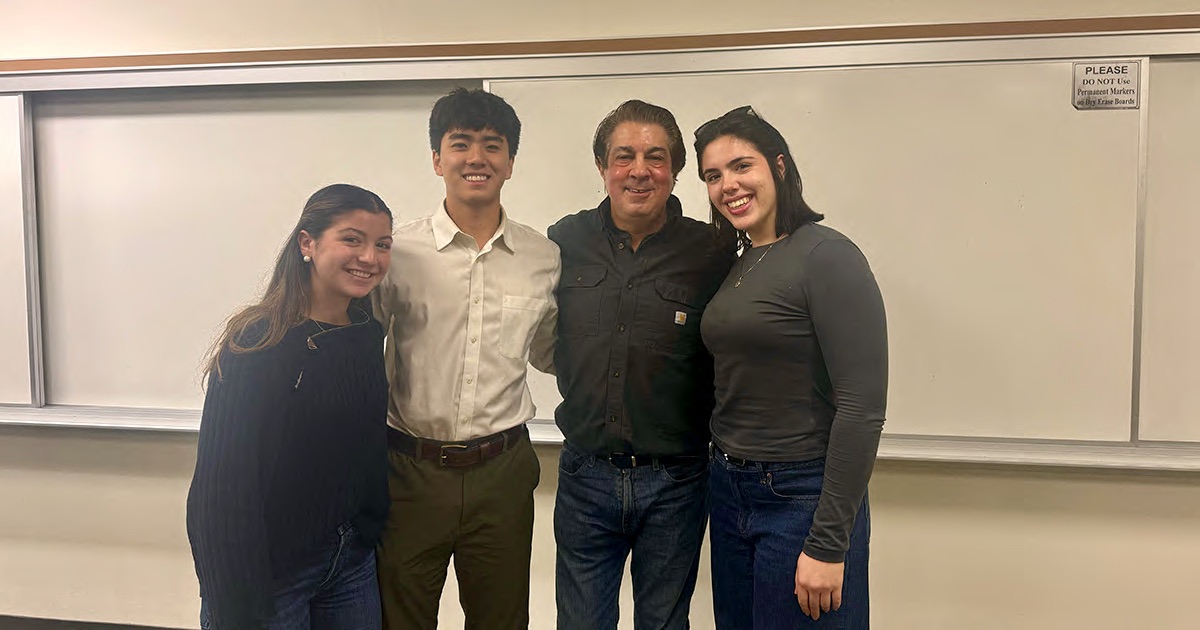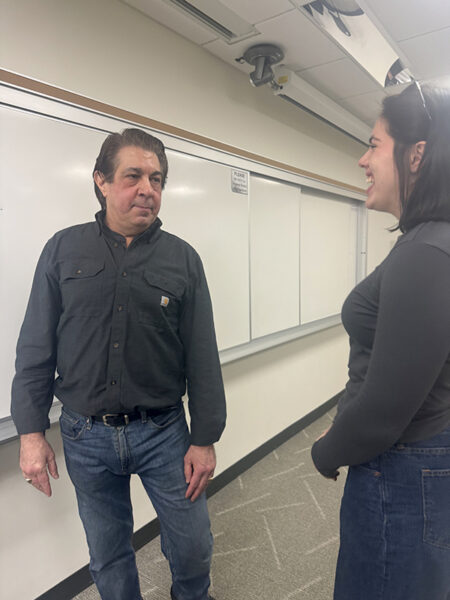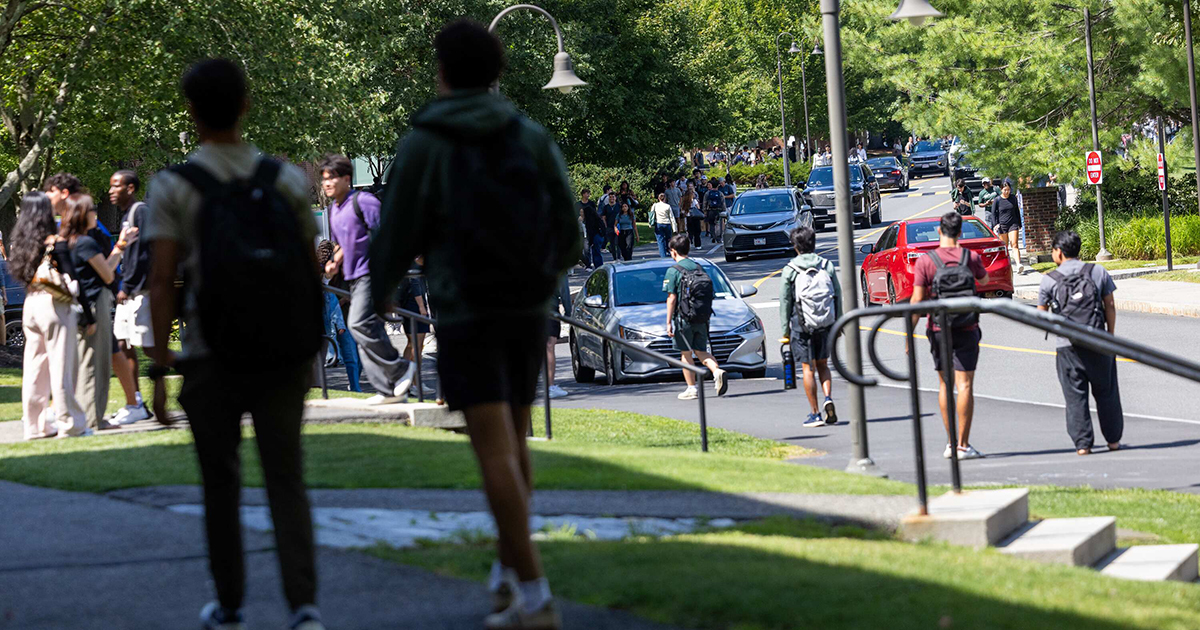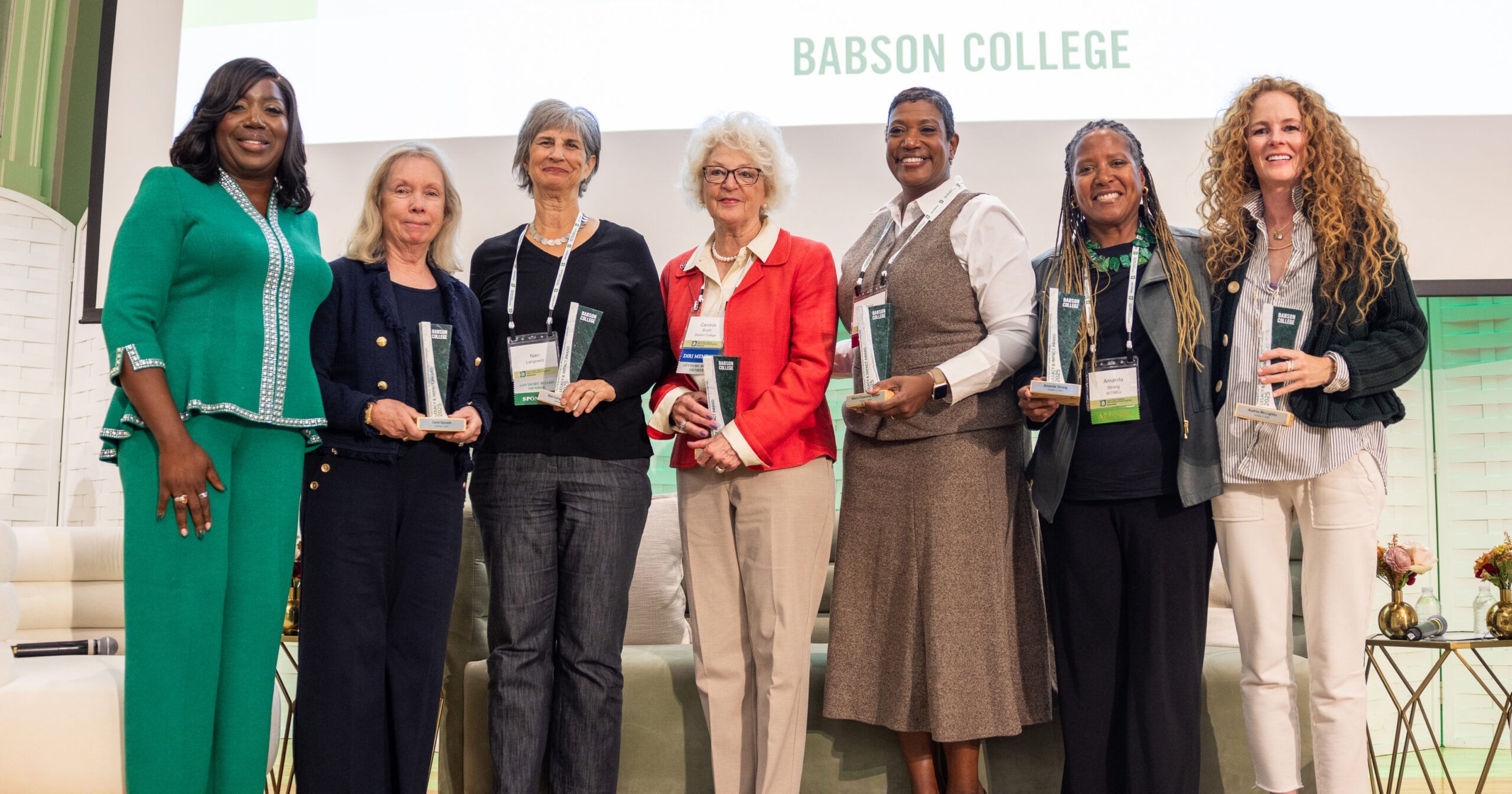Meet the Future: Insights from Mike Grandinetti’s AI Talk

Editor’s note: The New Tech Ventures Blog is produced by students in the New Technology Ventures course, taught by Assistant Professor of Practice Stephen Brand. The course features tech leaders and entrepreneurs as weekly guest speakers, and students are sharing their insights on the ventures and the experience. This post was written by the team of Stephanie Akerman ’25, Natalie Guillamon ’25, and Jeffrey Jiang ’25.
What if you could glimpse the future, pull it into the present, and transform industries with groundbreaking innovation?
This was the challenge presented by Mike Grandinetti during his guest lecture for Babson College’s New Tech Ventures class last month. A serial entrepreneur and award-winning professor with extensive experience advising companies such as Ferrari, Microsoft, and Capital One, Grandinetti also has taught at renowned institutions such as Harvard and MIT.
He shared his wisdom on how to leverage artificial intelligence (AI) to stay ahead in a rapidly changing world. His key message? Understanding AI is not optional; it is essential for shaping the future.
Future Fit: Role Models Embody Founder
Mike shared examples of generational role models who were uniquely suited to bring the future into the present.
Mark Andreesen was a student at the U of Illinois Urbana – Champaign and working as a part-time employee at the National Center for Supercomputing Applications, based at UIUC. He and his colleagues envisioned a future where the Internet was accessible to all – not just scientific researchers and the military and defense industry. He co-founded the seminal company Netscape that ushered in the World Wide Web era – the beginning of today’s digital age – which democratized access to the Internet for all.
Elon Musk has successfully backcasted from several audacious future visions. His companies include pioneers in digital payments (Paypal) , mass-produced 100% Battery Electric Vehicles (Tesla) to commercial space exploration (SpaceX) to brain-computer interfaces (Neuralink). The company received FDA all-important approval in May 2023, and the first human implantation occurred in January 2024.
Mike also shared a powerful counter-example-
Sam-Bankman Fried– the disgraced FTX co-founder now serving a 25-year sentence in federal prison who shared his vision of a universal cryptocurrency exchange based on the principles of “Effective Altruism”. In the end, it was a calculated move to create massive fraud and fund lavish lifestyles for the founders.
CHEGG vs KHAN ACADEMY: A TALE OF TWO CITIES
Mike compared 2 prominent EdTech companies that took decidedly different approaches when they became aware of the pending emergence of ChatGPT 3.5. The Khan Academy, under the leadership of Sal Khan, collaborated closely with OpenAI, fine-tuning the OpenAI Large Language Model specifically to support teachers and students. The result- the highly regarded AI-enabled Khanmigo, designed to deliver personalized student learning experiences while improving teacher productivity. Meanwhile, Chegg largely ignored the imminent AI revolution. Since the launch of GPT 3.5, Chegg has stock has lost 99% of its stock market value.
HARVEY AI: A Case Study in Industry-Specific Success
Given that LLMs like ChatGPT, Claude and Gemini are readily available, founders need to find other sources of durable strategic differentiation.
Mike discussed the importance of founders of AI-enabled companies bringing deep experiences and insights with access to unique data sources.
He highlighted HARVEY AI, a legal AI solution that secured contracts with 125 top law firms within just 18 months of its launch alongside ChatGPT 3.5 Its success came from a laser-focused approach: fine-tuning the OpenAI large language model, combined with Retrieval Augmented Generation capabilities, to access, process and analyze vast amounts of global legal data with unparalleled precision. Unlike general-purpose tools, HARVEY’s industry-specific approach met the unique needs of large law firms, providing a level of expertise that general-purpose competitors couldn’t match.
This story underscores that success in AI isn’t about access to common data from sources like Reddit and X—every LLM has been trained on it—it’s about how you can source hyper-relevant, industry use case -specific data.
HARVEY’s co-founders include a PhD neuroscientist, with prior experience at some of the most prestigious AI research labs in the world, including Deep Mind, Google Brain and Meta, along with a corporate lawyer. Together, they bring highly relevant complementary perspectives, emphasizing the vital importance of interdisciplinary expertise in driving innovation. The lesson for entrepreneurs is clear: combining specialized insights with a clear industry focus is a winning strategy in AI development.
Beyond Capital: Unique Insights Drive Success
Grandinetti drew a striking comparison between HARVEY AI’s achievements and Inflection AI, a project with luminary co-founders, including LinkedIn co-founder Reed Hoffman and Deep Mind co-founder Mustafa Suleyman. Their stature gave them access to infinite capital and top-tier researchers. Despite its pedigree and its resources, Character AI failed to gain traction because it lacked the unique insights and clear purpose that set successful startups apart. It’s chatbot, Pi, was positioned as a personal assistant. It was built on a general-purpose LLM that offered nothing unique and was outexecuted by OpenAI. The startup quickly determined it could not compete and Suleymon decided to join Microsoft where he now runs consumer AI. Most of the Inflection team has joined him. This rapid surrender sent shockwaves through the Silicon Valley AI community as it made clear how significant the challenges are. The remnants of Inflection have pivoted to an entirely new and challenging business model to license their LLM to enterprise customers.
This case study in failure reveals that success isn’t determined by how much money you have but by the clarity and originality of your vision. For entrepreneurs, this means focusing on innovative approaches and deep expertise rather than relying solely on financial backing. The ability to identify and solve specific problems with creativity and insight is the true differentiator in today’s competitive landscape.
Agentic AI and Custom Solutions
Mike next introduced agentic AI— the next wave- autonomous systems capable of decision-making with minimal human input—as the “holy grail” of AI development. He also discussed how generative AI is going to democratize innovation by enabling startups to create customized, end-to-end automated solutions for industry-specific, repeatable workflows at lower costs than traditional SaaS. This shift, known as “Services as Software” will level the playing field, allowing smaller companies to compete with industry giants like Salesforce and Workday. Entrepreneurs no longer need massive budgets to drive meaningful change. Instead, they can harness AI’s adaptability and ever-increasing affordability to build highly customized, practical applications that solve real-world problems.
The Ethical Imperative

Grandinetti shared a sobering example of AI’s societal impact: a 14-year-old who formed an unhealthy emotional attachment to an AI bot from Character AI, with tragic consequences. From this anecdote, he imparted the importance of designing AI responsibly, with foresight for potential unintended consequences. Even the most technically advanced and well-funded projects can fail ethically if they lack a clear commitment to safeguarding users. For entrepreneurs, this is a reminder that innovation must be paired with empathy and ethical responsibility. AI development isn’t just about what’s possible—it’s about what’s right.
AI Is for Everyone
“AI is transforming every industry, from healthcare to financial services to retail to manufacturing, and even those outside the tech sector need to understand its mechanisms and potential”, Grandinetti said. Falling behind in AI literacy could make it nearly impossible to stay competitive in any field. The key message here is that AI literacy is no longer a luxury—it’s a necessity. For individuals and businesses alike, keeping up with AI advancements is critical to adapting to the ever-evolving demands of the modern workforce.
Reflection
Mike Grandinetti’s talk was truly a game-changer. His insights into the evolution of AI, from basic learning to sophisticated reasoning, opened the class’s eyes to the limitless possibilities ahead. The discussion on how HARVEY AI has reshaped the legal field by offering tailored solutions for that specific industry sparked thoughts on how AI could also revolutionize real estate and community development—two areas of deep passion for many Babson students.
What stood out was Mike’s message that understanding AI is not just an option; it’s a necessity. Staying relevant in technology entrepreneurship requires keeping up with innovations and actively leveraging them to create meaningful change. It’s not about having infinite resources; it’s about having unique insights that can transform industries and lives.
The talk left everyone feeling inspired to dive deeper into AI, not just as a tool but as a partner in creating impactful solutions. This lecture served as a reminder that shaping the future involves embracing new technologies with creativity and purpose. Mike’s passion for innovation encourages the application of these lessons in the journey of building communities, and not just businesses.
Conclusion
Mike Grandinetti’s lecture was not just an overview of innovation; it was a lecture on embracing the rapid pace of innovation and recognizing AI’s significant impact across industries. He inspired us to look beyond the here and now, urging us to consider our future roles in a rapidly evolving landscape.
A key takeaway was the opportunity to enroll in the free, asynchronous Babson Foundations of AI Badge course that he developed. This valuable resource for Babson students, faculty and staff may have a cost in the future, so taking advantage of it now is wise for anyone wanting to stay competitive in a tech-driven world.
His guidance offered a roadmap for staying up-to-date in an ever-changing landscape. With that being said, what steps are you taking today to prepare for tomorrow’s challenges?
Posted in New Tech Ventures Blog





